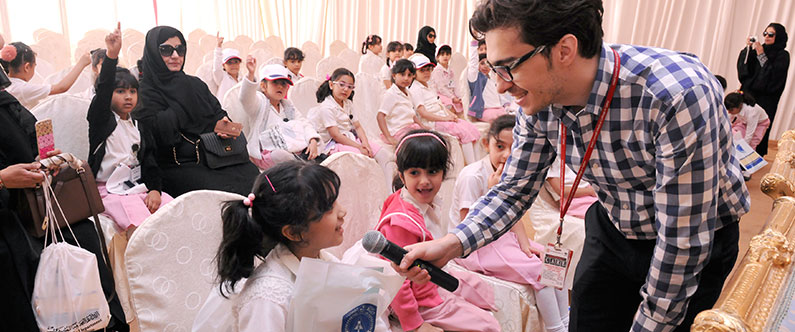Teaching the young about road safety
 Dr. Sohaila Cheema and Dr. Hekmat Alrouh talked to the children to elicit their views on road safety.
Dr. Sohaila Cheema and Dr. Hekmat Alrouh talked to the children to elicit their views on road safety.
Hundreds of children have been learning more about road safety thanks to WCM-Q’s Division of Global and Public Health.
Dr. Sohaila Cheema, director of global and public health, Dr. Hekmat Alrouh, projects specialist and Ms. Raji Anand, administration manager in the division participated in the 32nd GCC Traffic Week at Darb Al Saai, teaching children about the rules of the road, how to safely cross the street, the etiquette while traveling in a bus and how by following evidence-based best practices in road safety prevention, road traffic accidents and injury can be prevented.
Using videos and interactive question and answer sessions, Dr. Cheema and Dr. Alrouh, talked about the importance of seatbelts, why mobile phones should not be used while driving, and speeding among other topics. The hope is that as the children grow older and begin to drive themselves, they will remember the lessons they have learned. In addition, they will pass those lessons on to their families and friends, hopefully discouraging dangerous and anti-social driving among others.
Dr. Cheema said:
“The children we have been speaking to are all aware of the problems on Qatar’s roads so we have been encouraging them to take some responsibility for their own safety. This means always putting on a seatbelt when getting into a car, sitting in the back rather than front seat, and encouraging the driver to obey road safety laws.. Due to several measures taken by the government, road traffic fatality and injury rates have reduced in Qatar but there is room for further improvement. Although the children themselves aren’t driving, they can encourage their fathers, mothers and drivers to drive carefully and protect themselves, their families and other road users like pedestrians, motorcyclists and cyclists. Inculcating safe road behavior and creating awareness among children about road safety laws and safe driving culture are extremely important.”
Dr. Ravinder Mamtani, associate dean for global and public health said:
“Many of the accidents and injury happening on the roads worldwide are preventable. We all have a social responsibility to ensure that the road is a safe environment for all road users. The division of global and public health is delighted to have participated in the 32nd GCC Traffic Week.”
In all, more than 60 government departments, agencies and ministries, semi-government entities and private companies took part in Traffic Week with the aim of increasing awareness about road safety to ultimately reduce the number of accidents and road traffic injury on Qatar’s roads.